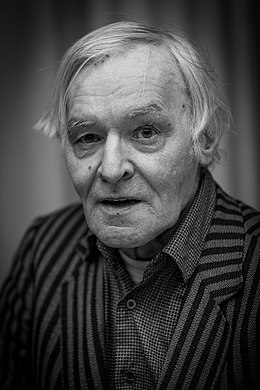Guillaume Faye died during the night of March 6 and 7. I knew he was battling cancer and that the end was near, but it was still a great shock to know that his fiery spirit had finally flickered out. It was my great privilege to have known Faye for more than 15 years; our movement has lost one of its most powerful voices, and I have lost a friend. I know no one who spoke for our people with more passion, insight, and conviction.
Faye was born in 1949 in the southeastern French city of Angoulême, to a middle-class family that was conservative, even Bonapartist. He would later note that the natural trajectory of his thinking was from French chauvinism to a pan-European patriotism that included whites wherever they live.
Faye and I attended the same school—the Paris Institute of Political Studies—though he was five years ahead of me and we did not know each other. While in school, he was already one of the key figures in the Study and Research Group of European Civilization—the French acronym, GRECE, means “Greece”—which is associated with the New Right philosopher Alain de Benoist. As a GRECE member from 1970 to 1986, he not only contributed to publications such as Éléments and Nouvelle École, but wrote two important books: Le Système à tuer les peuples (The System that Kills Peoples, 1981) and Nouveau discours à la nation européenne (New Discourse to the European Nation, 1985). Already in the early 1980s, Faye was writing about the impending death of Europe and how to save it. Even though Third-World immigration was a fraction of what it is today, he argued that non-Europeans must return to their homelands.
Nevertheless, at this time, Faye also believed that cultural and economic dominance by the United States was the greatest threat to Europe, and he proposed an alliance between Europe and the Muslim world to fight American influence. He saw the Islamic republic of Ayatollah Khomeini as a possible model for fundamentalist European nationalism and as an ally against American hegemony.
Faye broke with GRECE in 1987, mainly because he thought its leaders were too often lost in abstractions and refused to grapple with real problems. Faye then spent a period of nearly 10 years as a pop journalist and radio personality. His byline—sometimes his own, sometimes a pen name—appeared in center-right publications such as Figaro-Magazine, Paris-Match, Magazine-Hebdo, and Valeurs Actuelles. He was a popular DJ on the start-up radio station, Voice of the Lizard, and adopted the name of Skyman when the station went on to become the commercially successful Skyrock. He was a joker and prankster, and seemed to have left politics behind.
Guillaume Faye as Skyman, and in the photo to the right.
 During the 1990s, Faye wrote or co-wrote pop-culture titles. He was a pick-up artist well before anyone had heard of the manosphere.
During the 1990s, Faye wrote or co-wrote pop-culture titles. He was a pick-up artist well before anyone had heard of the manosphere.
Faye has never denied that he was something of a libertine in this period. He drank hard, took drugs, and even appeared in a few pornographic movies. But by the time I met him in 2003, he had returned to his true love: fighting for Europe. He had burst back onto the nationalist scene with Archeofuturism (1998), The Colonization of Europe (2000), and Why We Fight (2001). These three books alone would have secured him an honored place in our movement but, of course, he went on to write many more.
I will never forget our first meeting. Because I speak French and had visited France several times, I had met many of the great figures in French nationalism, but Faye was the one who most impressed me from the start. Sixteen years ago, even ardent French patriots hesitated to talk openly about race. Europeans can make ethnic/nationalist appeals without raising the vexed question of race, whereas Americans cannot. For us, cleavages are inescapably racial.
Faye understood race. He knew that European identity was both cultural and biological, and he welcomed me unreservedly as a fellow European fighting for our people. At the same time, I was struck by Faye’s erudition, the power of his mind, his facility for words, and his unwavering commitment.
Three years later, I invited Faye to what was his first appearance before an American audience. He spoke at the seventh American Renaissance conference, where his subject was “The Threat to the West.” He also spoke in 2012, on a theme that came to be one of his favorites: “America and Europe: Brothers in Arms.” Some in the audience struggled with his French accent, others were charmed by it, but everyone was caught up in his passion for our people.

In Europe, Faye became one of the most important intellectual leaders of the identitarian movement, which first took root in France, and is helping create a pan-European loyalty to the West. Identitarians from all over Europe are always present in the torchlight parades that mark the nationalist, independence-day celebrations that are especially popular in Eastern Europe.
Faye long ago discarded the view that Islam could help Europe resist America. At a 2006 conference in Moscow on “The Future of the White World,” he instead proposed a “Eurosiberian” federation for white nations. He called for the resurrection of the ancient Latin concept of the “Septentrion,” or a northern “ethnosphere” of white people.
In his personal life, Faye was a proponent of free sexual expression, which he sometimes linked to pre-Christian forms of morality. He identified with the spirit of paganism without being part of any movement to revive it as a living religion. Faye did not, however, limit his alliances. He was happy to make common cause with traditional Christians, royalists, young Catholics, neo-pagans, and even Americans if they shared his love for Europe and the people who created it.
In 2010, Arktos Media began translating Faye’s books into English, and now offers eight titles that cover the breadth of his work since Archeofuturism. Now the entire English-speaking world can marvel at Faye’s rhetorical power and mordant insights. Faye finally has the global audience he deserves, and distinctive Faye expressions such as “ethnomasochism,” “xenophilia,” devirilization,” and “archeofuturism” are now part of a world-wide vocabulary of racial consciousness.
Arktos will soon be publishing an English translation of Faye’s latest book, Racial Civil War. Faye asked me to write a preface for the original French version, which has just appeared. Our last conversations were by telephone from his hospital bed. I thanked him for the opportunity to render a final service to a brilliant man who threw himself into the greatest struggle of our time, and I was reassured to know that in his last days he was warmly cared for by family and by comrades young and old.
Racial Civil War is Faye at his most powerful and eloquent. He warns that Europe has only two choices: submission or racial civil war. His beloved France is at the center of the book, but Faye’s pitiless dissection of the servile mentality of French elites applies word for word to every white country from Germany to Canada to New Zealand. Racial Civil War is the final blast of a mighty trumpet, a glittering capstone to a life of struggle and commitment.
Faye dedicated this book to me and to my dear friend Sam Dickson, a Faye “co-combatant” of 40 years. This dedication underscores Faye’s conception of the global dimension of our fight, and his recognition that not all Americans are part of “the system that kills peoples.”
I will close with words from Faye’s introduction to Racial Civil War, which reflect the clarity and intensity of his commitment to France:
The autochthonous people—let us use the word, THE WHITES—live in exasperated misery, dispossessed in their own land. An unexpected spark could unleash righteous self defense and, at last, a counter-offensive. I don’t just talk about such a will to survive; I wish it.
The first duty of an intellectual is to be honest with his readers. . . . Yes, I want my people to rise up, to rekindle the pride they should never have lost, and to go on to final victory. I want this more than anything.





 del.icio.us
del.icio.us
 Digg
Digg
Commentaires
thanks so much for this necrology which on my www.alfredvierling.com/?p=5151 together with my video- meeting with him about his book ' La Colonisation de l'Europe' 1991 ( in French, Dutch subtitles)
Écrit par : alfred vierling | mardi, 12 mars 2019
thanks so much for this necrology which on my www.alfredvierling.com/?p=5151 together with my video- meeting with him about his book ' La Colonisation de l'Europe' 1991 ( in French, Dutch subtitles)
Écrit par : alfred vierling | mardi, 12 mars 2019
thanks so much for this necrology which on my www.alfredvierling.com/?p=5151 together with my video- meeting with him about his book ' La Colonisation de l'Europe' 1991 ( in French, Dutch subtitles)
Écrit par : alfred vierling | mardi, 12 mars 2019
thanks so much for this necrology which on my www.alfredvierling.com/?p=5151 together with my video- meeting with him about his book ' La Colonisation de l'Europe' 1991 ( in French, Dutch subtitles)
Écrit par : alfred vierling | mardi, 12 mars 2019
Les commentaires sont fermés.